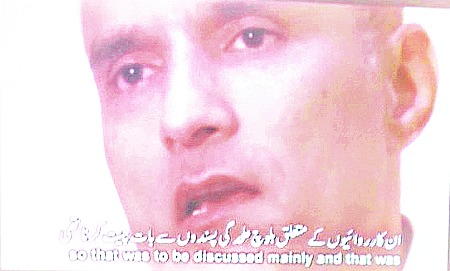
New Delhi, April 10: Pakistan today announced a death sentence for former Indian navy officer and alleged spy Kulbhushan Jadhav, triggering a sharp protest from India and setting the stage for a fresh cycle of tit-for-tat acts that could reverse recent steps aimed at easing tensions.
Foreign secretary S. Jaishankar summoned Pakistan's high commissioner in New Delhi, Abdul Basit, this evening to hand over a demarche - a diplomatic protest note - calling a secret military trial that culminated in the sentencing "farcical".
India pointed out that its high commission in Islamabad had on 13 occasions sought consular access to Jadhav, an Indian national, but had been denied a chance to interact with the former naval officer.
The Indian mission in Islamabad sought access to Jadhav through diplomatic notes six times in 2016 - March 25, March 30, May 6, June 10, July 11 and December 19. In the first three months of 2017, India sought access seven more times - on January 19, twice on February 2, on February 3, March 3, March 21 and March 31, officials said.
The announcement of the death sentence comes two days after Prime Minister Narendra Modi criticised Pakistan for its role in the brutalities in Bangladesh that preceded the 1971 war, and for terrorism from its soil.
"If this sentence against an Indian citizen, awarded without observing basic norms of law and justice, is carried out, the government and people of India will regard it as a case of premeditated murder," said Jaishankar's demarche to Basit.
Earlier in the day, Asif Ghafoor, spokesperson for the Inter Services Public Relations (ISPR), the Pakistan military's media wing, issued a release saying that the country's army chief Qamar Javed Bajwa had "confirmed the death sentence" for Jadhav.
Pakistan has accused Jadhav of spying for India's external intelligence agency, the Research and Analyses Wing (RAW), and of assisting separatist groups in Balochistan. According to Pakistan, Jadhav was arrested in a counter-intelligence operation in Mashkel, Balochistan.
The statement said Jadhav had been tried by a Field General Court Martial under the Pakistan Army Act (PAA) and had been found guilty of violating the PAA and that country's Official Secrets Act.
"He confessed before a magistrate and the court that he was tasked by RAW to plan, coordinate and organise espionage/sabotage activities aiming to destabilise and wage war against Pakistan by impeding the efforts of law enforcement agencies for restoring peace in Balochistan and Karachi," the ISPR statement said.
The statement said Pakistan had provided Jadhav with a "defending officer".
But the Indian foreign office said the trial was conducted without any "credible evidence" against Jadhav, and pointed out that the Indian high commission "was not even informed" that the former navy officer was being brought to trial.
"The claim in the ISPR release that Shri Jadhav was provided with a defending officer during the so-called trial is clearly absurd in the circumstances," the foreign office said.
India insists Jadhav was abducted from Iran, where he was working as a private contractor near Chabahar port - which New Delhi is now developing with Tehran - and has suggested that it was Pakistan's intelligence agencies that had detained him. It has rejected allegations that Jadhav worked for the RAW.
The foreign ministry today also referred to comments Pakistan's de-facto foreign minister, Sartaj Aziz, made in the country's Upper House, the Senate, on December 7. "What the dossier (following investigations) contained (on Jadhav)," Aziz had said according to Senate records, "did not have any conclusive evidence." The Pakistan foreign ministry later that day claimed Aziz had been misrepresented in the Senate.
But Indian officials cautioned that if Pakistan goes ahead with the death sentence for a military veteran like Jadhav, it would almost certainly close any possibility of a meaningful dialogue between the South Asian neighbours for months, if not years.
It would also likely trigger a counter-move from India, which in turn could spark a chain reaction that will not be easy to stop.
The announcement of the sentence by the Pakistan military threatens to unravel efforts the civilian governments of the two countries have taken in recent weeks to break out of a downward spiral in ties through last year.
Twin terror attacks on Indian military installations - in Pathankot in January 2016 and in Uri in September - and unrest in Kashmir that New Delhi blamed on Islamabad led to almost daily allegations and counter-allegations between the nations. Each of the neighbours accused multiple members of the other's high commission of working as spies, and sent them back.
But in November, Pakistan's leaders wished Indian foreign minister Sushma Swaraj speedy recovery after a kidney transplant surgery, while Modi wished his Pakistan counterpart Nawaz Sharif on his birthday.
Pakistan sent back an Indian soldier who had strayed across the Line of Control, and India repatriated a Pakistani boy brought to this country by his father without the permission of the child's mother. Pakistan also placed the alleged mastermind of the 2008 Mumbai terror attacks, Hafiz Saeed, under house arrest.











